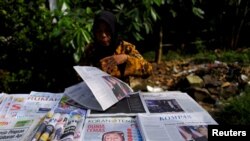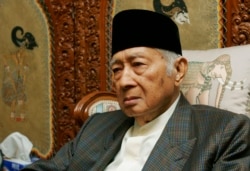Leonard Triyono contributed to this report, which originated on VOA Indonesia.
JAKARTA, INDONESIA — The Indonesian press continues to be constrained by regulations and acts of violence, according to Abdul Manan, chairperson of the Alliance of Independent Journalists (AJI).
“The government produced regulations that did not support freedom of the press, with which, as we are aware of in recent times, many have become the victims,” he said last week on the sidelines of the AJI national conference on the challenges of journalism in the digital age.
The regulations that have the potential to impede the press were ratified in 2014 by the People’s Consultative Assembly (MPR), the People’s Representative Council (DPR), Regional People’s Representatives Council (DPRD) and the Regional Representative Council (DPD).
Known collectively as the MD3, the regulations regulate punishment for those who are charged with insulting the MPR, DPR, DPRD and DPD. Meanwhile, Indonesia’s Amended Criminal Code contains 13 articles that can be used to silence criticism of the government, its policies and officials.
However, the Information and Electronic Transaction Law (ITE) originally passed in 2008 and amended in 2016 has been used against 14 journalists, seven media outlets, and dozens of private citizens between 2013 to 2018, according to data from the Southeast Asian Freedom of Expression Network (SAFEnet).
Threat of violence
In addition to the threats posed by the regulations, members of the Indonesian press are under constant threat of physical violence. AJI notes that between 2006 and 2014 there were an average of 50 cases of violence against journalists each year. Government officials and community groups perpetrated most of the attacks.
“What we have witnessed recently is that the pressure exerted by the mobs has also increased,” Manan said. “This is something that during the New Order era was almost nonexistent. That started to take place a lot after 1999.”
The New Order refers to the three-decade authoritarian rule of Suharto that ended in 1998. Although the government lifted restrictions on the press in May 1998, within the year, journalists were reporting to the international monitors at the Committee to Protect Journalists that they feared reprisals if they reported the details of ethnic killings in Pontianak, West Kalimantan province.
Media freedom improves
That said, media freedom in Indonesia has improved significantly since the end of the Suharto era. Indonesia now has hundreds of television stations (including cable), more than 2,000 radio stations and 1,000 newspapers, as well as web-based media outlets, according to Human Rights Watch.
Reporters Without Borders (RSF), which ranks press freedom in 180 countries, notes that Indonesia’s position has gradually improved, from number 130 in 2016 to number 124 in 2017 and 2018. In Asia, Indonesia’s position is better than those of Myanmar, Cambodia and Singapore. However, Indonesia still ranked lower than Timor Leste, Hong Kong and Japan.
But the recent increase in attacks by community groups is an expression of their frustration, said Ade Wahyudin, director of LBH Pers (Legal Aid Center for the Press), because they know of no other mechanism for objecting to coverage. The formal process for registering complaints with the Press Council costs more than most people can afford, because complaints can be filed only in Jakarta.
“The public could not find proper ways to file complaints about what they consider slanderous news. As a result, they took the laws into their own hands,” he said.
Attacks by authorities
However, Ade said acts of violence by government authorities must end because they should know the Press Law guarantees freedom of the press.
“If you say the police do not understand it, then we are somewhat doubtful because the police have the laws and they can read. If it were the general public, it would still be reasonable, but if it is the police, if it is an act of violence committed by the police, whether it is directed to journalists or to anyone, then that is not allowed. You know that journalists are protected by laws. They do their job — they should be protected,” he asserted.
Since the Press Law was enacted 20 years ago, AJI reports, there has been overall progress. There is much less government intervention over content it deems objectionable, Manan said.
“Government’s direct interference has been almost nonexistent, because there is now no authority that can revoke SIUPP [License for Press Publication],” Manan said. “And the government no longer interferes in the affairs of the Press Council. It is because the Press Council has become independent. It is no longer controlled by the government like in the past.”





